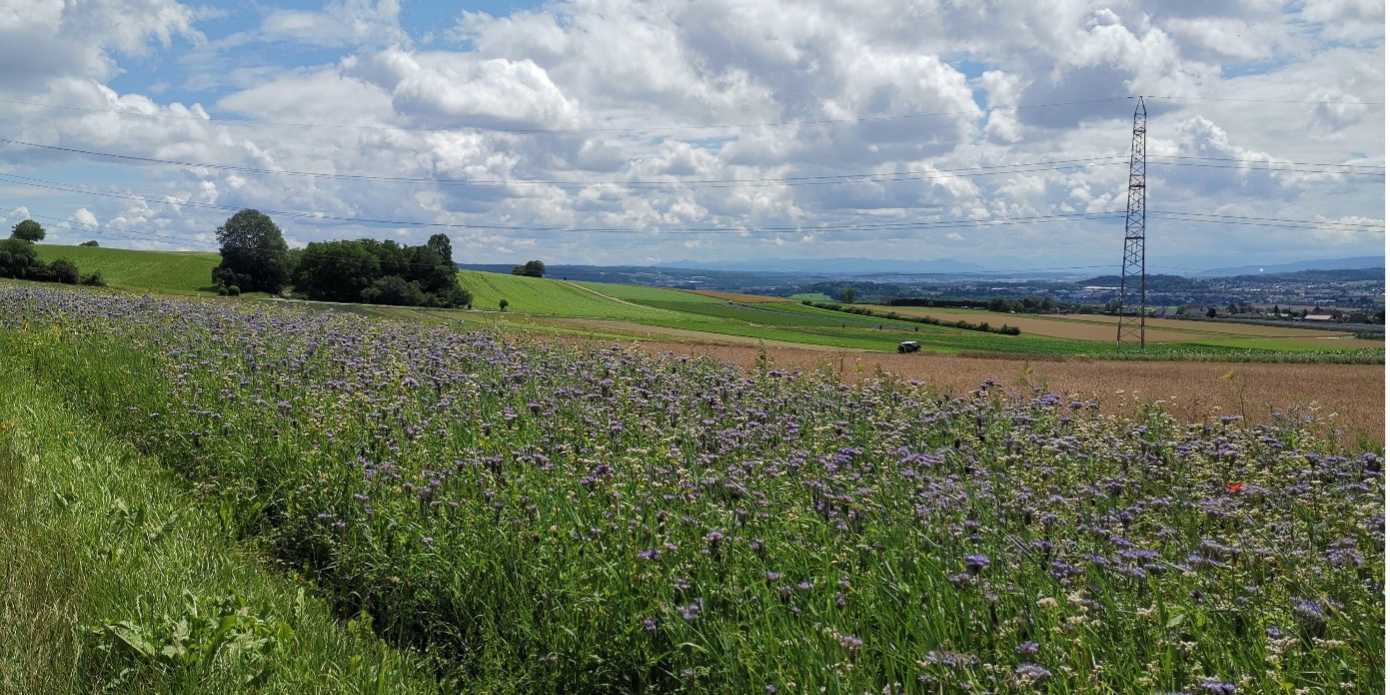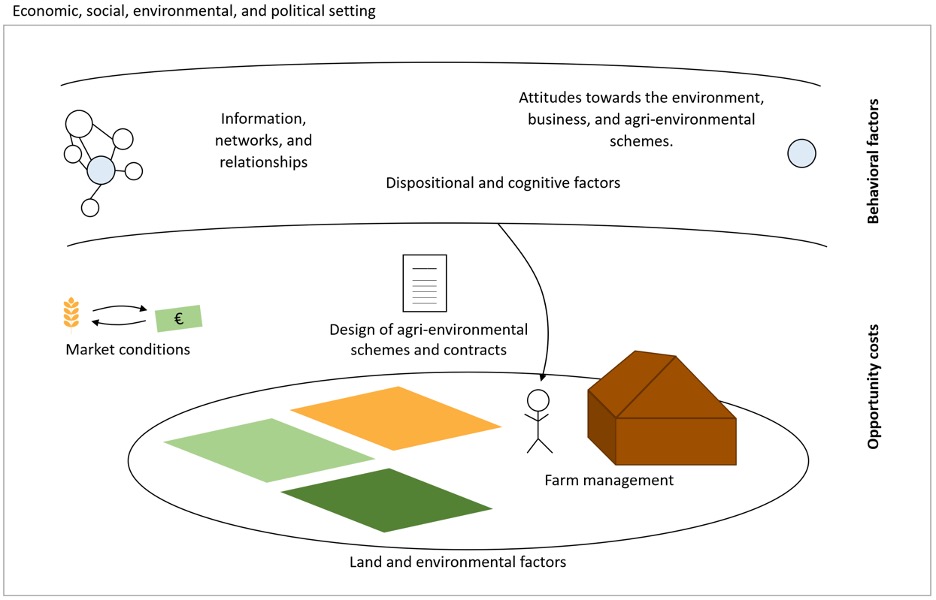Why do farmers participate in agri-environmental schemes?
Agri-environmental schemes seek to improve the sustainability of agriculture, but their success depends on farmer participation. Using a systematic review of 79 scientific articles, we summarised the key factors that play a role in farmers’ uptake of such schemes.

By: Sergei Schaub, Jaboury Ghazoul, Robert Huber, Wei Zhang, Adelaide Sander, Charles Rees, Simanti Banerjee, und Robert Finger
Voluntary agri-environmental schemes are an important element of agricultural policies globally. Farmers are rewarded for implementing environmentally friendly practices that deliver positive environmental outcomes. However, agri-environmental schemes often fail to meet the expectations for ecosystem and biodiversity protection1. The existing structure and design of such schemes therefore requires improvement if their effectiveness is to be enhanced1-3. Designing ambitious agri-environmental schemes that enhance farmer uptake requires a comprehensive understanding of the factors that affect participation. This includes, especially, behavioural factors and opportunity costs. We define behavioural factors as the cognitive, emotional, personal, and social traits that influence human decision-making4. This includes, for example, environmental attitudes and trust in others or in the political processes. By opportunity cost, we refer to forgone benefits resulting from the adoption of environmentally friendly practices as opposed to alternative practices. This could include lower yields or higher labour demand.
In our recent study published in the Journal of Agricultural Economics (see Ref 5), we systematically reviewed the scientific literature that covers the behavioural factors and opportunity costs that play a role in farmers' participation in agri-environmental schemes, focusing on arable farms in Australia, Europe, and North America. We evaluated 79 articles that include over 700 factors (including both behavioural factors and opportunity costs) (Figure 1: Economic, social, environmental, and politival setting).

We found several behavioural factors to be consistently associated with participation in agri-environmental schemes. These included participation in agricultural training, receipt of advice, and the existence of networks. The positive associations of networks could be gained by, for example, fostering knowledge exchange among farmers about environmentally friendly practices or registration processes. An existing positive attitude towards agri-environmental schemes was also associated with greater participation in agri-environmental schemes, and such attitudes might/can be developed through education, training and knowledge exchange.
Opportunity costs also were connected to farmers’ participation, such as opportunity costs related to market conditions. For example, higher product prices are negatively related to participation, as might be expected if agri-environmental schemes reduce crop productivity. Farmers are, however, more likely to participate in agri-environmental schemes if implementation costs of environmentally friendly practices are relatively low. This favours farms that already implement some environmentally friendly practices, or that are managed organically. The design of agri-environmental schemes also plays an important role, as farmers are more likely to participate if the necessary commitment duration of the scheme is shorter, or the choice of environmentally friendly practices that can be adopted is more flexible.
Our results have several implications for agricultural policy. Participation could be encouraged through targeted training and advice for farmers, which if designed appropriately could foster a positive attitude among farmers towards agri-environmental schemes. The support and promotion of networks among farmers could also help spread positive attitudes towards environmental actions, and hence lead to increased likelihood of participation in such schemes. Training and advice for farmers, as well as peer-to-peer knowledge exchange, may become increasingly important as societal and policy pressures grow for agriculture reform1, 6-7. The relationship between opportunity costs and participation can also help advance the development of agri-environmental schemes. For example, greater flexibility in the contractual duration and range of allowable practices could encourage greater participation. Greater flexibility can, however, often weaken environmental outcomes and goals. Therefore, it is imperative that the trade-off between flexibility and delivery is considered by policy-makers.
Taking account of behavioural factors and opportunity costs can improve the design of agri-environmental schemes, and increase the likelihood of farmer participation. Outcomes are, however, often context-specific, and often depend on the nature of the scheme, farm type, and region. This complicates interpretations about how behavioural factors and opportunity costs underpin participation. There is therefore a need for studies that examine these effects in more detail to identify underlying motivation for joining agri-environmental schemes under a range of agricultural scenarios.
Acknowledgements
This blog is based on research led by Sergei Schaub and published as Schaub et al. 2023 (see references). This research was part of the Bayer-funded research project Enhancing Biodiversity and Resilience in Crop Production, led by ETH Zurich and IFPRI.
References
1. Pe'er, G., Bonn, A., Bruelheide, H., Dieker, P., Eisenhauer, N., Feindt, P. H. et al. (2020). Action needed for the EU Common Agricultural Policy to address sustainability challenges. People and Nature, 2(2), 305-316. https://doi.org/10.1002/pan3.10080
2. Pe'er, G., Finn, J.A., Díaz, M., Birkenstock, M., Lakner, S., Röder, N. et al. (2022) How can the European common agri-cultural policy help halt biodiversity loss? Recommendations by over 300 experts. Conservation Letters, 15, e12901. https://doi.org/10.1111/conl.12901
3. 3. Elmiger, N., Finger, R., Ghazoul, J., & Schaub, S. (2023). Biodiversity indicators for result-based agri-environmental schemes–Current state and future prospects. Agricultural Systems, 204, 103538. https://doi.org/10.1016/j.agsy.2022.103538
4. Dessart, F. J., Barreiro-Hurlé, J., & Van Bavel, R. (2019). Behavioural factors affecting the adoption of sustainable farming practices: a policy-oriented review. European Review of Agricultural Economics, 46(3), 417-471. https://doi.org/10.1093/erae/jbz019
5. Schaub, S., Ghazoul, J., Huber, R., Zhang, W., Sander, A., Rees, C., ... & Finger, R. (2023). The role of behavioural factors and opportunity costs in farmers' participation in voluntary agri‐environmental schemes: A systematic review. Journal of Agricultural Economics. https://doi.org/10.1111/1477-9552.12538
6. Ehlers, M. H., Finger, R., El Benni, N., Gocht, A., Sørensen, C. A. G., Gusset, M. et al. (2022). Scenarios for European agricultural policymaking in the era of digitalisation. Agricultural Systems, 196, 103318. https://doi.org/10.1016/j.agsy.2021.103318
7. Schaub, S., Huber, R., & Finger, R. (2020). Tracking societal concerns on pesticides–a Google Trends analysis. Environmental Research Letters, 15(8), 084049. https://doi.org/10.1088/1748-9326/ab9af5